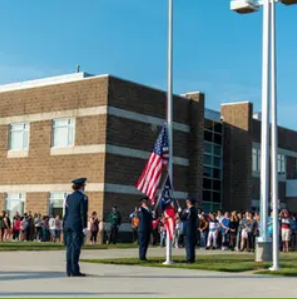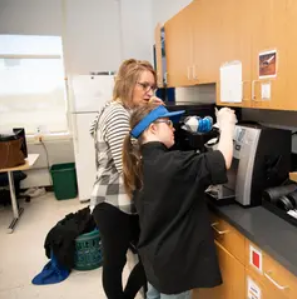




CRJ101
1 Credit + 3 College Credits
This course is a survey of agencies and processes involved in the administration of criminal justice. The survey reviews the functions of the legislature, police, prosecutor, courts, and the correctional system. Problems of law enforcement in a democratic society are discussed. This course ties together all components of criminal justice and includes issues of both the juvenile and adult offender.
CRJ205
1 Credit + 3 College Credits
This course introduces students to the sources of law in the United States, the differences between civil and criminal law, and the United States Legal System including federal and state judicial systems. Students will learn about several areas of substantive law such as criminal law, tort law, contract law, and family law.
04256
1 Credit + 3 College Credits
In this course, students investigate the scientific theories of human behavior and their applications. They explore the anatomy of the brain discovering why people behave the way they do.
CRJ350
1 Credit + 3 College Credits
This Capstone course provides an introduction to technology used in the criminal justice system including, the basic principles of computers with respect to police information systems, Interagency Criminal Justice Information, the National Law Enforcement Telecommunications Systems, National Criminal Justice Computer System, (FBI) National Incident-Based Reporting System, and a variety of databases used in the criminal justice system. The legal and ethical considerations will be discussed. Criminal justice information system databases will be reviewed for application to a variety of issues.

JDG9401
1 Credit
Students will review study skills, personal grooming, goal setting, decision making, choosing a career path, maintaining a positive attitude, coping with change, values clarification, image assessment, enhancing necessary workplace success skills, group dynamics, conflict resolution, and life skills math.
JDG9402
1 Credit
Coursework includes problem-solving, teamwork, goal setting, money management, workplace math, courtesy and respect, customer service, workplace diversity, writing job applications, career interests, entrepreneurship, leadership and understanding insurances.
JDG9403
1 Credit
Participants learn about career vocabulary, resume writing, sources of jobs, telephone skills, listening skills, stress management, personal budgeting, occupational preferences, career manual, verbal presentations, critical thinking, constructive criticism, and professional ethics.
JDG9404
1 Credit
Students receive instruction in time management, cover letters, choosing career attire, employment interview, job survival, performance evaluations, business etiquette, employee rights, pay and benefits, financial planning, career travel, writing a letter of resignation, and career portfolio. Each senior will develop a Career Portfolio that includes a resume, references, a sample job application, and commendations. JDG 12 may be the student’s co-op class ONLY if JDG is the student’s Pathway (the student’s third or fourth year of JDG classes) and the counselor approves it.

ROTC7006
1 Credit
This foundation course explores the heritage of flight, the development of air power, and the role of military aerospace forces in our society. Leadership concepts include an introduction to the ROTC mission, customs, and courtesies; proper wear of the uniform; organization; basic drill and ceremonies; the meaning and purpose of attitude, discipline, and respect; principles of good citizenship, personal standards, values, and ethics; leadership and management techniques; organizational skills; good study habits, time management, and personal development; and health, drug, and alcohol abuse awareness.
ROTC7011
1 Credit
Students gain an in-depth knowledge of the aerospace environment; human requirements of flight; principles of flight, propulsion & navigation; and world cultural studies. Leadership concepts stress oral, written, and listening communication skills development; understanding individual & group behavior; leadership theory; and advanced drills and ceremonies. Students also learn practical applications in management by applying for positions of responsibility within the corps.
ROTC7012
1 Credit
This course explores aircrew survival; space propulsion systems; space exploration; the historical significance of a civilian/military venture into space; and the fundamentals of rocketry. Leadership concepts include preparation for life after high school; the importance of obtaining advanced degrees or skills; job search preparations; financial planning; career opportunities; and advanced drill and ceremonies. Students demonstrate increased leadership and management responsibilities through the various staff positions within the corps.
ROTC7013
1 Credit
Students apply the leadership and management principles learned in previous courses by managing the cadet corps. They establish policies & guidelines for the effective planning, organizing, coordinating, and directing all aspects of the corps in a proactive matter. Problem-solving, decision-making, negotiating, managerial, communication, and organizational skills are honed. Students will also assist instructors in leadership & academic training. The course is restricted to senior (4th year) cadets and 3rd-year cadets who are selected for a key leadership role within the unit through an interview process.
ROTC9100
1 Credit
This foundation course explores the heritage of the U.S. Army and its role in the growth of our nation. Leadership concepts include an introduction to the Army JROTC mission and core values.
ROTC9102
1 Credit
This course explores the historical significance of national military and nonmilitary service. This includes the role of each branch of the U.S. Armed Forces, the Merchant Marines, the Peace Corps and other organizations within our federal government. Leadership concepts include preparation for life after high school; the importance of obtaining advanced degrees or skills; job search preparations; financial planning; career opportunities; and advanced drill and ceremonies. Students demonstrate increased leadership and management responsibilities through the various staff positions within the corps.
ROTC9103
1 Credit
Students apply the leadership and management principles learned in previous courses by managing the cadet corps. They establish policies and guidelines to effectively plan, organize, coordinate and direct all aspects of the corps. Problem-solving, decision-making, negotiating, managerial, communication, and organizational skills are honed. Students will also assist instructors in leadership and academic training.


Appoquinimink School District
118 S. Sixth Street
Odessa · DE · 19730
WBL@appo.k12.de.us
apposchooldistrict.com